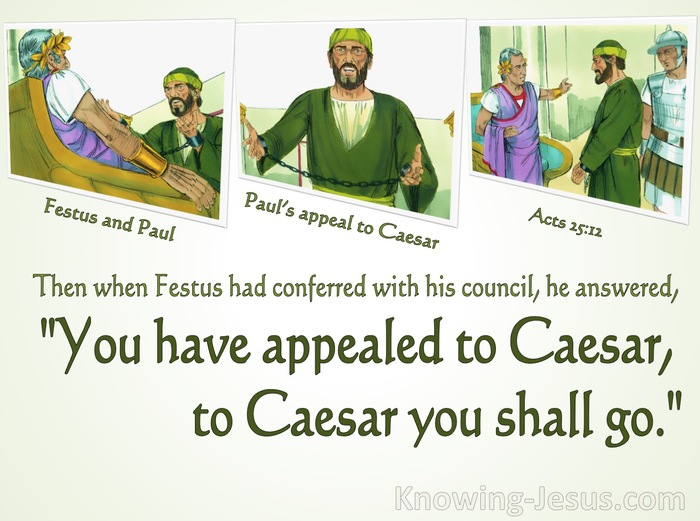26 Bible Verses about Authority, of human institutions
Most Relevant Verses
Therefore God abandoned them to impurity, letting them follow the cravings of their hearts, till they dishonored their own bodies; For they had substituted a lie for the truth about God, and had reverenced and worshiped created things more than the Creator, who is to be praised for ever. Amen. That, I say, is why God abandoned them to degrading passions. Even the women among them perverted the natural use of their bodies to the unnatural;
For they are God's servants appointed for your good. But, if you do what is wrong, you may well be afraid; for the sword they carry is not without meaning! They are God's servants to inflict his punishments on those who do wrong.
Let every one obey the supreme Authorities. For no Authority exists except by the will of God, and the existing Authorities have been appointed by God. Therefore he who sets himself against the authorities is resisting God's appointment, and those who resist will bring a judgment upon themselves.
"You would have no power over me at all," answered Jesus, "if it had not been given you from above; and, therefore, the man who betrayed me to you is guilty of the greater sin."
Submit to all human institutions for the Lord's sake, alike to the emperor as the supreme authority,
This, too, is the reason for your paying taxes; for the officials are God's officers, devoting themselves to this special work.
especially for kings and all who are in high positions, in order that we may lead a quiet and peaceful life in a deeply religious and reverent spirit.
and to governors as the men sent by him to punish evil-doers and to commend those who do right.
Let every one obey the supreme Authorities. For no Authority exists except by the will of God, and the existing Authorities have been appointed by God.
Tell us, then, what you think. Are we right in paying taxes to the Emperor, or not?" Perceiving their malice, Jesus answered: "Why are you testing me, you hypocrites? Show me the coin with which the tax is paid." And, when they had brought him a florin,read more.
He asked: "Whose head and title are these?" "The Emperor's," they answered: on which he said to them: "Then pay to the Emperor what belongs to the Emperor, and to God what belongs to God."
These men came to him and said: "Teacher, we know that you are an honest man, and are not afraid of any one, for you pay no regard to a man's position, but teach the Way of God honestly; are we right in paying taxes to the Emperor, or not? Should we pay, or should we not pay?" Knowing their hypocrisy, Jesus said to them: "Why are you testing me? Bring me a florin to look at." And, when they had brought it, he asked: "Whose head and title are these?" "The Emperor's," they said;read more.
And Jesus replied: "Pay to the Emperor what belongs to the Emperor, and to God what belongs to God." And they wondered at him.
Are we right in paying tribute to the Emperor or not?" Seeing through their deceitfulness, Jesus said to them: "Show me a florin. Whose head and title are on it?"read more.
"The Emperor's," they said; and Jesus replied: "Well then, pay to the Emperor what belongs to the Emperor, and to God what belongs to God."
You are bound, therefore, to obey, not only through fear of God's punishments, but also as a matter of conscience. This, too, is the reason for your paying taxes; for the officials are God's officers, devoting themselves to this special work. In all cases pay what is due from you--tribute where tribute is due, taxes where taxes are due, respect where respect is due, and honor where honor is due.
Remind your hearers to respect and obey the Powers that be, to be ready for every kind of good work, to speak ill of no one, to avoid quarreling,
Submit to all human institutions for the Lord's sake, alike to the emperor as the supreme authority, and to governors as the men sent by him to punish evil-doers and to commend those who do right.
In all cases pay what is due from you--tribute where tribute is due, taxes where taxes are due, respect where respect is due, and honor where honor is due.
Show honour to every one, Love the Brotherhood, 'revere God, honour the emperor.'
But Peter and John replied: "Whether it is right, in the sight of God, to listen to you rather than to him--
"The Emperor's," they answered: on which he said to them: "Then pay to the Emperor what belongs to the Emperor, and to God what belongs to God."
And Jesus replied: "Pay to the Emperor what belongs to the Emperor, and to God what belongs to God." And they wondered at him.
"The Emperor's," they said; and Jesus replied: "Well then, pay to the Emperor what belongs to the Emperor, and to God what belongs to God."
Faith caused the parents of Moses to hide the child for three months after his birth, for they saw that he was a beautiful child; and they would not respect the King's order.
First of all, then, I urge that petitions, prayers, intercessions, and thanksgivings should be offered for every one, especially for kings and all who are in high positions, in order that we may lead a quiet and peaceful life in a deeply religious and reverent spirit.
In the morning the Magistrates sent the police with an order for the men to be discharged. The Governor of the Jail told Paul of his instructions. "The Magistrates have sent an order for your discharge," he said, "so you had better leave the place at once and go quietly away." But Paul's answer to them was: "They have flogged us in public without trial, though we are Roman citizens, and they have put us in prison, and now they are for sending us out secretly! No, indeed! Let them come and take us out themselves."read more.
The police reported his words to the Magistrates, who, on hearing that Paul and Silas were Roman citizens, were alarmed, And went to the prison, and did their best to conciliate them. Then they took them out, and begged them to leave the city.
Up to this point the people had been listening to Paul, but at these words they called out: "Kill him! A fellow like this ought not to have been allowed to live!" As they were shouting, tearing off their clothes, and throwing dust in the air, The Commanding Officer ordered Paul to be taken into the Fort, and directed that he should be examined under the lash, that he might find out the reason for their outcry against him.read more.
But just as they had tied him up to be scourged, Paul said to the Captain standing near: "Is it legal for you to scourge a Roman citizen, unconvicted?" On hearing this, the Captain went and reported it to the Commanding Officer. "Do you know what you are doing?" he said. "This man is a Roman citizen." So the Commanding Officer went up to Paul and said: "Tell me, are you a Roman citizen?" "Yes," replied Paul. "I had to pay a heavy price for my position as citizen," said the Officer. "I am one by birth," rejoined Paul. The men who were to have examined Paul immediately drew back, and the Officer, finding that Paul was a Roman citizen, was alarmed at having put him in chains.
Three days after Festus had entered upon his province, he left Caesarea and went up to Jerusalem. There the Chief Priests and the leading men among the Jews laid an information before him against Paul, And asked a favor of him, to Paul's injury--to have Paul brought to Jerusalem. All the while they were plotting to make away with him on the road.read more.
But Festus answered that Paul was in prison at Caesarea, and that he himself would be leaving for that place shortly. "So let the influential men among you," he said, "go down with me, and if there is anything amiss in the man, charge him formally with it." After staying among them some eight or ten days, Festus went down to Caesarea. The next day he took his seat on the Bench, and ordered Paul to be brought before him. On Paul's appearance, the Jews who had come down from Jerusalem surrounded him, and made many serious charges, which they failed to establish. Paul's answer to the charge was--'I have not committed any offence against the Jewish Law, or the Temple, or the Emperor.' But, as Festus wished to gain popularity with the Jews, he interrupted Paul with the question: "Are you willing to go up to Jerusalem and be tried on these charges before me there?" "No," replied Paul, "I am standing at the Emperor's Bar, where I ought to be tried. I have not wronged the Jews, as you yourself are well aware. If, however, I am breaking the law and have committed any offence deserving death, I do not ask to escape the penalty; but, if there is nothing in the accusations of these people, no one has the power to give me up to them. I appeal to the Emperor." Upon that, Festus, after conferring with his Council, answered: "You have appealed to the Emperor; to the Emperor you shall go."
Bible Theasaurus
- Human (514 instances)
- Institutions (1 instance)
Related Topics
- Attitudes Towards Kings
- Authority
- Be Subject To People
- Citizens, Christian Duties
- Citizenship
- Civic Duties
- Civil Government
- Civil authorities
- Giving Back
- Giving Money To The Church
- Giving To God
- Giving To Others
- Giving, Of Possessions
- God Possessing
- Government
- Honoring Authority
- Honour The Honourable
- Human Authority, Christian Response
- Human Authority, Instituted By God
- Human Authority, Nature Of
- Judicial Punishment
- Kingship, Human
- Knowing About God's Kingdom
- Leaders
- Leaders, Political
- Loving Everyone
- Loyalty
- Magistrates
- Ministry, Nature Of
- Obedience, To Human Authorities
- Orderliness In Society
- Politics
- Punishment, Nature Of
- Resistance

